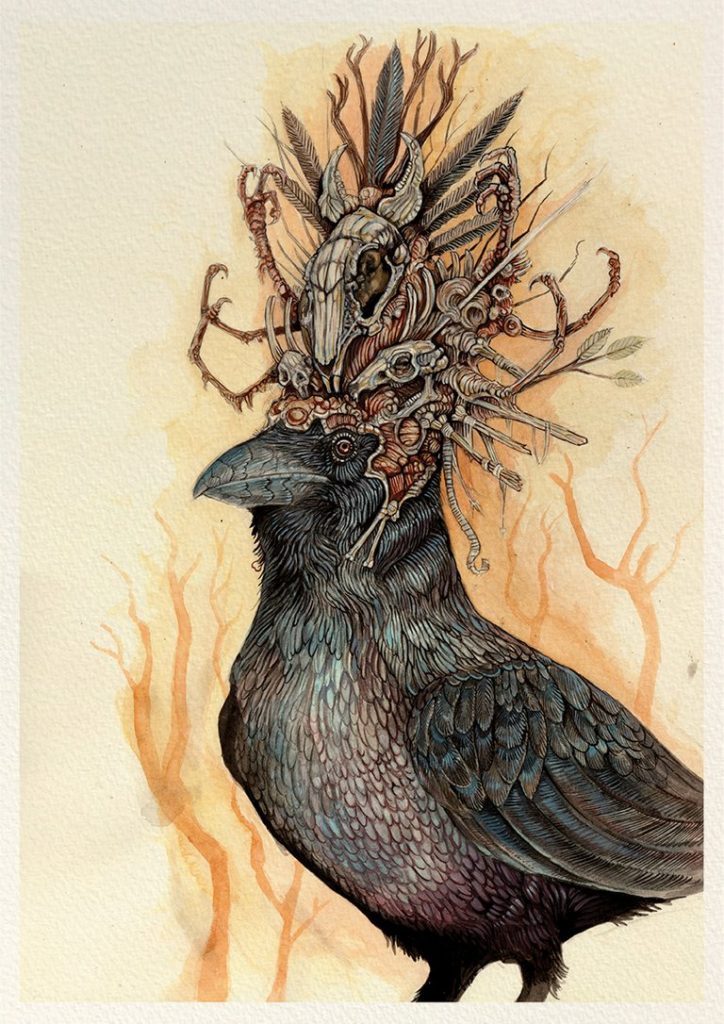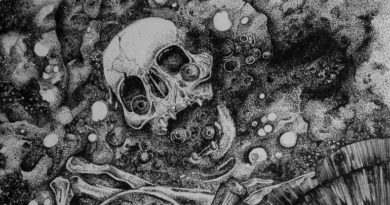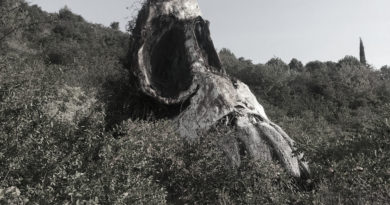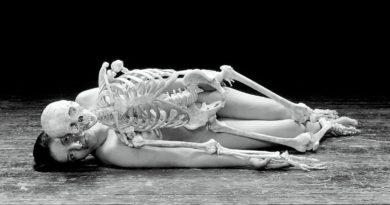Entrevista a AlexCF – Interview with AlexCF
CASTELLANO (english below)
Ilustrador, escultor, diseñador y cantante en bandas como Fall of Efrafa y Morrow, AlexCF es un polifacético artista del Reino Unido. Hablamos con él acerca de su mundo interior y su visión sobre los tiempos que nos ha tocado vivir.
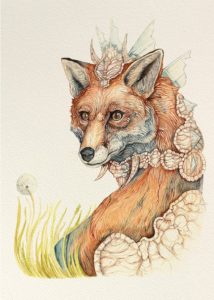 ATENEO OCVLTO: En primer lugar, queríamos darte las gracias por tu tiempo. Teníamos muchas ganas de saber más acerca de ti y tu carrera, especialmente en estos tiempos tan extraños y turbulentos. ¿Cómo estás viviendo toda esta situación de la pandemia?
ATENEO OCVLTO: En primer lugar, queríamos darte las gracias por tu tiempo. Teníamos muchas ganas de saber más acerca de ti y tu carrera, especialmente en estos tiempos tan extraños y turbulentos. ¿Cómo estás viviendo toda esta situación de la pandemia?
ALEXCF: ¡Hola! ¡Gracias a ti por la oportunidad! Ha sido una situación difícil para todos, yo soy afortunado por tener un estudio en el que puedo trabajar manteniendo la distancia social, así que he continuado creando tanto como ha sido posible. Incluso me las he arreglado para dirigir unos cuantos proyectos durante el confinamiento. Creo que los principales problemas han sido de tipo personal, como el no poder ver a mi familia que vive a unas horas de aquí y estar preocupado por mis padres. Es ahora cuando me doy cuenta de los efectos psicológicos que esto ha conllevado para todos; hay un sentimiento colectivo, un estado de ánimo que parece invadirlo todo. La gente está enfadada, los gobiernos están fallando en la tarea de sostener a aquellos a quienes gobiernan. Esta necesidad de poner la economía por delante de la gente tendrá consecuencias en el futuro.
AO: Eres un artista muy polifacético. Dibujante, escultor y músico. ¿Cómo desarrollaste todas estas habilidades? ¿Hubo una inicialmente o fuiste aprendiendo todas a la vez?
ACF: ¡Yo no lo llamaría habilidades!. Es sobre todo un deseo de hacer las cosas que me gustan, encontrando en el proceso las herramientas para hacerlo. Pintar y dibujar siempre han sido prácticas muy catárticas y positivas para mí, es una manera de plasmar ideas rápidamente, al tiempo que encuentras nuevas ideas y caminos que seguir. Siempre me ha gustado dibujar, incluso siendo muy joven. No puedo considerarme músico, ya que no toco ningún instrumento, pero ya que la música en sí misma es un instrumento para mí, artística y políticamente, así que fundar bandas era un camino para combinar mi amor por la escritura, el arte y la música.
AO: La temática que tratas es realmente cautivadora, y no me refiero sólo a tu trabajo más visual. Tu banda Fall of Efrafa o tu último proyecto Morrow son igualmente llamativos. ¿Comparte algún mensaje común que quieras transmitir a quien se encuentre con tu trabajo?
ACF: El mensaje común, si es que hay alguno, es la oposición a la opresión. Creo que todas las historias que se cuentan en mis bandas tienen que ver con derrocar ideologías que buscan tener el control. Fall of Efrafa estaba basado en la novela La Colina de Watership, de Richard Adams y, a pesar de que el propio Adams lo negara, el libro trata sobre el destronamiento de dictadores y los grilletes que suponen la ocupación humana. De una forma un tanto naíf he tratado de plasmarlo en un concepto y es una idea que he explorado subsiguientes proyectos. La historia en Morrow es una secuela de otra banda en la que participé llamada Archivist, que narraba las represalias de un pueblo oprimido, teniendo como resultado la destrucción de la civilización humana. Morrow tiene lugar miles de años después de esto, entre las ruinas de la humanidad, sobreviviendo en un futuro organizado en tribus primitivistas. La historia trata de mostrar el surgimiento de aquella cultura para frenar los deseos de otras tribus, repitiendo los mismo errores de opresión y colonialismo una vez más.
AO:¿Son dos proyectos con un mismo núcleo temático, pero por qué la idea terrenal post-apocalíptica de una y la idea de un futuro al más puro estilo ciencia ficción en otra?
ACF: Como mencionaba en la anterior pregunta, en realidad son la misma historia, narrada en diferentes épocas de la humanidad. Me apasiona la ciencia ficción en todas sus formas y el crust punk que hay dentro de mí también quería explorar la idea de culturas anarco-primitivistas viviendo en los bosques del futuro. Archivist se sitúa en un futuro cercano, uno que retrata el surgimiento de la inteligencia artificial y nuestro deseo de controlarla. Sin embargo no puedes crear un ser sintiente y esperar que cumplan tus órdenes.
La historia explora los conceptos de persona*, existencialismo, religión y creencia. Morrow parecía ser la respuesta perfecta a esa cuestión, un mundo en el que la humanidad ha encontrado el equilibrio con aquello que lo rodea, una sociedad que vive en simbiosis con la naturaleza. La historia de Archivist finaliza con esos dos mundos separados encontrándose, la misma historia desde dos perspectivas diferentes. Fue un divertido ejercicio de exploración que duró nada menos que ¡siete álbumes!.
*AlexCF utiliza la palabra “personhood”, que podría definirse como el estatus de persona. Esto tiene implicaciones tanto legales como filosóficas, siendo motivo de debate en cuestiones como el aborto, los derechos de los animales, religión, ética etc…
AO: Existen dos libros que contienen una parte de tu trabajo como ilustrador y que son, bajo mi punto de vista, tus obras más impactantes. ¿De dónde surgió la idea de publicar ya no uno, sino dos libros?
ACF: El primer libro es una novela, fue una idea con la que he estado trabajando durante años, creando mi propia mitología animal. Crecí consumiendo alta fantasía (El Señor de los Anillos, Redwall, Las Crónicas de Narnia y, por supuesto, La Colina de Watership), que me condujo a Fall of Efrafa. Mi deseó fue continuar la banda, pero tras los fallidos intentos de hacerlo, tuvo sentido abandonar mi amor por ese libro y escribir el mío propio. Quería incorporar mi amor por la mitología animal con algunas ideas medioambientales y políticas. Tras cuatro años finalmente acabé mi primer libro “Seek the Throat from Which we Sing” (Busca la Garganta desde la que Cantamos).
Mientras escribía dibujé mucho para ayudarme a visualizar los personajes y así cree un gran cantidad de dibujos que podría convertirse en una guía visual del libro. Se conocería como Orata, un compendio de las culturas y credos de Naa, una enciclopedia de especies.
AO: En ese mundo ilustrado parece que quieres representar a los animales con un toque mágico, casi divino. ¿Podría ser una metáfora de una naturaleza que debemos preservar, casi como un elemento sagrado?
ACF: No tanto de algo divino sino de la humanidad como aberración, un experimento fallido. La naturaleza es ensalzada en la representación que se hace de ella en los libros, su cultura es más compleja que la de su “contraparte viviente”, pero sólo en un esfuerzo por crear una aventura. Sabemos que los animales son interdependientes, sabemos que muchas especies trabajan juntas. La supervivencia es un deber, pero los animales también juegan, se divierten, pelean, lloran. El animal humano ha tenido oportunidades para explorar todo ello un millón de veces y como resultado hemos creado la civilización. A pesar de todos nuestros logros, nunca hemos dejado de pensar que quizá éstos podrían no ser tan positivos para nosotros y el resto de especies del planeta. Esta es la idea que explora el libro, si los humanos sucumbieran ante su propia arrogancia, ¿qué mundo heredarían el resto de animales.? ¿acabarían también intoxicados por esa arrogancia? ¿O esa interdependencia natural, ese pacto silencioso, permitiría un planteamiento más cooperativo de la existencia?.
AO: Si pensamos en todos los personajes que viven en ese universo, podemos pensar que muchos de ellos son como un espejo que reflejan algo o a alguien de nuestra realidad. Cuéntanos cómo es el proceso de creación de estos personajes.
ACF: ¡Qué pregunta tan difícil de responder!. Sí, los personajes poseen diferentes facetas de una opinión. Existe una cuestión y existe aquellos cuyas opiniones difieren respecto a esa cuestión, aquellos que desean utilizarla para el bien o el mal y aquellos que trabajan juntos para hacer alguna de los dos. En la historia hay un número de personajes principales y se deja entrever que existe una especie de saga de salvadores, pero no tiene que ver con una sola persona, sino con la cooperación. Podemos depositar todas nuestras esperanzas pero al final es necesaria que todos tomemos parte para que exista un cambio.
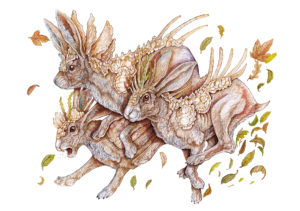 AO: ¿Te sientes especialmente representado por alguno de ellos?
AO: ¿Te sientes especialmente representado por alguno de ellos?
ACF: Uno de los personajes llamado Rune. Es un joven y naíf Starling que lidia con los sentimientos hacia sus padres, sobre su papel en todas las cosas. Lo escribí con mucho de mí mismo en la mente.
AO: Estamos viviendo un tiempo en el que somos piezas activas en un tablero sociopolítico global. En muchos aspectos no somos dueños de nuestro propio futuro ¿Crees que existe alguna posibilidad de que lleguemos a encontrar, como especie, nuestra propia Colina de Watership?
ACF: Depende de cómo sea esa colina. Yo sueño con una sociedad que haya trascendido las pequeñas diferencias, abrazando una relación con la tecnología más compasiva, en armonía con la naturaleza, encontrando alguna clase de equilibrio con la tierra y los pueblos indígenas. Que haya hecho desaparecer la naturaleza competitiva y destructiva del capitalismo, reemplazándola por un sistema más cooperativo, más en sintonía con algo similar al micelio** de los hongos, actuando como un conducto para aquellos que lo necesitan, apoyándose unos a otros. Para alguien que valora el capital, dios, las armas de fuego y su nación, esa colina es un pantano. Todo es cuestión de perspectiva.
**El micelio es una red filamentosa formada por hifas (ramificaciones formadas por las esporas germinadas que llevan alimento hacia el hongo), de manera similar a como lo hace la raíz en una planta.
AO: A pesar de toda esta tormenta creativa, aún tienes tiempo para diseñar tu propia línea de ropa, llamada Allies Clothing. No sabemos cómo lo haces, pero nos encanta. ¿Por qué una línea de ropa?
ACF: Me apetecía tener alguna camiseta sobre los derechos animales en un tono agresivo y en aquella época ¡nadie hacia algo así!. Pensé que sería una buena manera de involucrarme en alguna clase de activismo, recaudando dinero para grupos por los derechos de los animales y ¡haciendo camisetas monocromáticas con algún mensaje cabreado!.
¿Podrías explicarnos qué significa el veganismo para ti y cómo influencia tu trabajo? ¿Crees que es un movimiento inherentemente político?
ACF: Hace muchos años escuché la banda de punk Propagandhi y su álbum Less talk more rock. La letra de que decía
“No puedes negar que la carne es asesinato. La leche es violación. Soy tan estúpido como cualquiera, pero conozco mis errores. He reconocido una forma de opresión, ahora reconozco el resto. La vida es demasiado corta para hacer más que cualquier otra sea aún más corta”.
Recuerdo haber pensado “¡Yo estoy de acuerdo con esto!”, así que tuve que tomar una decisión. No podía ignorarlo, seguir con mi defectuoso vegetarianismo o simplemente aceptar que los animales no son mercancía y anhelan cada segundo de su vida, al igual que yo. ¡Y eso fue todo! Tuve suerte de estar rodeado por amigos que sentían lo mismo y tras quince años aquellas palabras aún resuenan en mí. Es un movimiento que crea conciencia, una mirada compasiva, pero también científica. Puedes debatir la semántica del lenguaje, por qué o por qué no, pero después de todo los humanos somos herbívoros. Tenemos mandíbulas que se articulan lateralmente y dientes planos para comer plantas. Tenemos enzimas que digieren las plantas en la saliva, un intestino largo para absorber agua, ácido estomacal débil que no puede digerir carne cruda sin peligro de intoxicación. ¡Tuvimos que inventar la tecnología del fuego para hacer la carne comestible! Puede provocarnos cáncer y enfermedades coronarias. La agricultura animal es el mayor productor de gases de efecto invernadero, la menos eficiente económicamente y la que más carente de nutrientes. En este punto el consumo de carne es un lujo arcaico, envuelto en un negacionismo muy “macho”. Dentro de veinte años, si aún seguimos aquí, creo que la agricultura animal será insostenible. Además, los animales merecen tener el derecho sobre sus propios cuerpos. ¿Cómo podemos negar a criaturas sintientes el derecho a poseer sus propios miembros? Es una locura.
AO: En el Reino Unido hay una cultura vegana importante y no sólo de manera pasiva. Hay grupos y colectivos como Hunt Saboteurs que defienden a los animales y la naturaleza. ¿Crees que las nuevas generaciones están más concienciadas y dispuestas a tomar parte para hacer un mundo más respetuoso con el medio ambiente?
ACF: Creo que es un cambio general en las sociedades. Estamos siendo expuestos a mucha más información gracias a las redes sociales y sí, mucha de esa información es parcial, pero creo cuanto más nos enfrentamos a los problemas sociales, tanto más rápido vemos cambios sociales. El Reino Unido vio nacer el Frente de Liberación Animal y las acciones directas por la liberación animal, así que una historia de tomar parte por tí mismo en lo que tiene que ver con el bienestar de los no-humanos. Este movimiento es global y la actitud está cambiando, aún así siempre habrá una gran resistencia al cambio.
AO: Actualmente hay muchas bandas y sellos comprometidos con un mensaje contra los discursos racistas, homófobos y ultranacionalistas. Paralelamente existe una corriente que se esfuerza en tomar una postura apolítica ¿Qué piensas de “separar al artista de su obra”?
ACF: Crear música es algo muy personal, un proceso íntimo, ya sea individual o junto a otras personas de similar pensamiento. No diré que sólo debieran existir bandas políticas, pero vivimos tiempos muy polarizados, donde los problemas de justicia social afectan a todos los aspectos de la vida y siento que incluso si tu música es apolítica, nuestras vidas personales e interacciones son también lugares para el debate y la discusión.
AO: Cuéntanos algo acerca del Museo Merrylin Cryptid. Es un proyecto fascinante ¿Cómo surgió la idea? Es posible que vuelva a resurgir?
ACF: Fue allá por 2006 y fue el trabajo de mi mujer durante trece años. En esta época de bulos y visiones superficiales del mundo, no hay lugar para disgresiones del tipo “¿Qué pasaría sí?” o “quizá”. En cualquier caso estoy trabajando en un libro que recopila diarios escritos por Merrylin. Algún día verá la luz, ¡pero por el momento no es una prioridad!.
AO: Nos ha encantado poder conocerte y acercarnos un poco mas a ese mundo que no para de crecer en tu mente. ¿Hay algún proyecto futuro del que puedas hablarnos?
ACF: ¡Claro! Actualmente estoy trabajando en un libro ilustrado de ocultismo antifascista, mientras escribo la secuela de mi primera novela. También estoy pensando en convertir ese mundo de mitología animal en juego de rol.
Musicalmente estamos componiendo el próximo disco de Morrow, así como de otra banda llamada Wreathe, con miembros de Morrow. Durante el confinamiento hemos creado un EP de d-beat llamado Social Distance y ¡saldrá en vinilo a finales de este año!
¡Muchas gracias de nuevo!
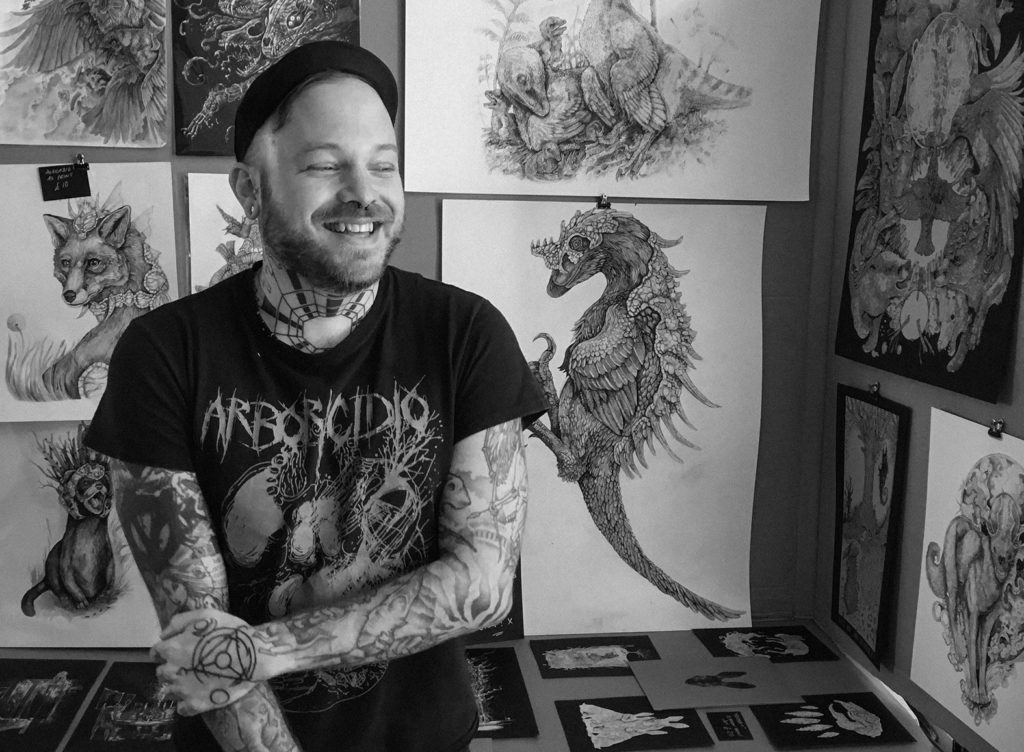
ENGLISH
Ilustrator, sculptor, designer and singer in bands like Fall of Efrafa and Morrow, AlexCF is a polifacetic artist from United Kingdom. We talked with him about his inner world and how he percieves the times we are living in.
ATENEO OCVLTO: First for all, we want to thank you for your time and attention. We were looking forward to know about you and your career, specially in these stranger and turbulent times. How are you living all this pandemic situation?
ALEX: Hi, thank you for the opportunity! Life has been difficult for everyone, I am fortunate to have a studio i can work from where I could social distance, so as much as possible I have continued to create. I even managed a bunch of “lock down” projects. I think the main issues have been personal, not being able to see my family, who live a few hours away, worrying about my parents. I am now noticing the psychological effect this has had on us all; there is a collective feeling, or mood that seems to underpin everything, people are angry, governments are failing to support those they govern, this need to put economy before people will have ramifications in the future.
AO: As we can see, you are a prolific artist. Drawer, sculptor and musician. How did you developed all these skills? Is there a primal one or you were learning all of them at the same time?
ACF: I wouldn’t call them skills! It was mostly a desire to make the things I love and in doing so you find the tools to do so. Painting and drawing have always been very cathartic and positive practices for me, its a way to realise ideas quickly, and in doing so, finding new ideas and paths to follow. I have always loved drawing, even as a very young kid. I can’t claim to be a musician, as I don’t play any instruments, but music was instrumental (no pun intended) in who I am as a person, politically and artistically, and starting bands was a way of combining my love of writing, art and music.
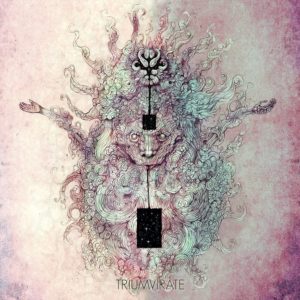
AO: The topics and subjects are really captivating, and I’m not talking only about your visual work. Your band Fall of Efrafa or your last project Morrow share are equally eye-catching. Is there a common message you want to transmit to anyone who get to know your work?
ACF: The common message, if there is one is opposing oppression. I think all of my bands stories have been about overthrowing ideologies that seek to control. Fall of Efrafa was based around the novel Watership Down by Richard Adams, and despite Adam’s opinion to the contrary, the book was about overthrowing dictatorships and the shackles of human occupation. I naively attempted to adapt that into a concept, and an idea that I explored in subsequent bands. The story in Morrow is a sequel to another band i was involved is called Archivist, which also follows the retaliation of an oppressed people and as a result, the destruction of human civilisation. Morrow takes place thousands of years after this, in the ruins of humanity, eking out an existence in future primitivist tribes. The story attempts to show that culture rising to stem the desire of other tribes in repeating these same mistakes of oppression and colonialism once again.
AO: They are two projects with the same thematic core, but why the earthly post-apocalyptic idea of one and the idea of a future of the purest science fiction style in another?
ACF: As mentioned in the previous question, they are the same story told in different eras of humanity. I have a huge passion for science fiction in its many forms and the crust punk in me also wanted to explore anarcho primitivist cultures living in forests of the future. Archivist is set in the near future, one that depicts the rise of artificial intelligence and our desire to control that. But you cannot create a sentient being and then expect it to do your bidding. The story was exploring the ideas of personhood, existentialism, religion and belief. Morrow felt like a fitting answer to that question, a world where humanity has found equilibrium with its surroundings, a society that lives symbiotically with nature. The story of Archivist ends with these two very separate worlds meeting, the same story told from two very different perspectives. It was a fun exploration, played out over seven records!
AO: There are two books containing a part of your illustration work, which I think are your most striking work. Where did the idea of publishing not one, but two books, came from?
ACF: The first book is a novel, it was an idea I had been playing with for years, creating my own animal mythology. I grew up on a diet of high fantasy- Lord Of The Rings, Redwall, Chronicles of Narnia, and of course Watership Down – It lead to Fall of Efrafa, and in my desire to continue that band, and my attempts failing, it made sense to abandon my love of that book and write my own. I wanted to incorporate my love of animal mythology with some environmental and political ideas. After four years I finally finished my first book, “Seek The Throat From Which We Sing”. Whilst I was writing, I drew a lot to help visualise characters, and in doing so created a wealth of drawings that would become a visual guide to the aforementioned book, this would come to be known as the Orata; a compendium of the cultures and creeds of Naaa.’ an encyclopaedia of sorts.
AO: In that illustrated world it seems like you want to represent animals with a magic aura, almost divine. Could this be a metaphor of a nature we have to preserve as it were sacred?
ACF: Not divine so much, more that humanity is an aberration, an experiment gone wrong. Nature is represented in a heightened way in the books; their culture is more complex than their living counterparts but only in an effort to create an adventure. We know that animals are interdependent, we know many species work together. Survival is a must, but also animals play, animals have fun, animals fight, animals cry. The human animal has had ample opportunity to explore all of these things a billion times over, and as a result, we created civilisation. In all our achievements, we never stopped to think if perhaps those achievements might not be good for us, or the other species on this planet. This is what the book explores, if humans were to succumb to their hubris, what world would the other animals inherit, would they also be intoxicated by arrogance? Or would that natural interdependence, that unspoken treaty allow for a more cooperative approach to life?
AO: If we think about all of the characters living in that universe, we could think that a lot of them are a mirror that reflects something or someone from the real world. Tell us about the process of creating a character.
ACF: Thats a difficult question to answer! yes; characters form different facets of an opinion- you have the issue, those whose opinions differ on that issue, those who wish to use it for good, or evil, those who work together to do one of those things. In the story, there are a number of main protagonists and you are lead to believe that there is some saviour saga, but the story is not about one person, its about cooperation. We can put all of our hope on one person to save us, but in the end, it will take all of us to change.
AO: Do you feel yourself specially represented by any of those characters?
ACF: One of the main characters called Rune. He is a young, naive Starling who struggles with his feelings about his parents, about his place in all things. I wrote him with a lot of myself in mind.
AO: We are living a time where we are active pieces in a global sociopolitical dashboard. In many aspects, we don´t own our own future. Is there any chance to us, as a species, to find our own Watership Hill?
ACF: It depends what that hill looks like. I daydream about societies that have transcended the petty indifferences, embracing a more compassionate relationship with technology that works in harmony with nature, finding some kind of equilibrium with land and indigenous peoples, about removing the competitive and destructive nature of capitalism, and replacing it with systems that are more cooperative, more in tune with something akin to the mycelium** of fungi, acting as a conduit for those in need and supporting one another. To someone who values capital, god and guns and their nation – that hill is a swamp. It’s all a matter of perspective.
**The mycelium is some kind of filamentous network formed hyphae (ramificactions formed from germinated spores which provides nutrition to the fungus), similar to how the root provides nutrition to a plant.
AO: Despite all this creative maelstrom, you still have time to design a clothing line called Allies Clothing. We don’t know how you manage to make all this stuff, but we love it!. Why a clothing line?
ACF: I wanted some angry animal rights shirts and at the time, no one really made them! So I thought this would be a good way to be involved in some sort of activism, raising money for animal rights groups, and making very monochromatic shirts with very angry statements!
AO: Could you explain to us what is veganism to you, and how it influence your work? Do you think it is an inherently political movement?
ACF: Many years ago, I was listening to the punk band Propagandhi, and their album ‘Less talk more rock,’ and the lyric
“But you cannot deny that meat is still murder. Dairy is still rape. And I’m still as stupid as anyone, but I know my mistakes. I have recognized one form of oppression, now I recognize the rest. And life’s too short to make another’s shorter”
I remember thinking, “I agree with this!” and I had to make a decision, I could ignore that fact, go on with my flawed vegetarianism, or just accept that animals are not commodities, and that they want every second of life, just like me. So that was that! I was lucky to be surrounded by friends who felt the same, and 15+ years on, those lyrics still resonate with me. It’s a consciousness raising movement, it’s a compassionate view, but also a scientific view. You can debate the semantics of language, of why or why not, but at the end of the day, humans are herbivores. We have side swinging jaws and flat teeth to chew plants, we have plant digestive enzymes in our saliva, we have long intestines for water absorption, weak stomach acid that cannot digest raw meat without the threat of food poisoning. We had to invent the technology of fire to make meat palatable for us! It can lead to cancers and heart disease. Animal agriculture is the largest contributor to greenhouse gases, the most uneconomical, and nutrients lacking. At this stage, meat consumption is an archaic luxury wrapped up in some macho contrarianism. In 20 years, if we’re still here, I imagine animal agriculture will be unsustainable. Plus animals deserve the right to their own bodies, how can we deny sentient creatures the right to own their limbs? Madness.
AO: In UK there is a huge vegan culture, and not only in a “passive” way. There are groups like Hunt Saboteurs actively defending animals and nature. Are new generations more concerned and willing to take actions to make a world respectful of the environment?
ACF: i think its a general shift in societies, we are all being exposed to so much more of everything due to social media, and yes, a lot of that is confirmation bias, but I think that the more social issues are confronted the quicker we see social change. The UK gave birth to the Animal liberation Front, and direct action in regards to animal liberation so there is a history of taking ideas into your own hands when it comes the welfare of non humans, but this is a movement that is global and attitudes are changing. But there will always be a strong resistance to change.
AO: There are a lot of bands and labels committed with a message against racists, homophobic and ultranationalist speech. At the same time, there are a huge trend of bands and artists trying to look apolitical. Do you think artists about “separating the art from the artist”?
ACF: Creating music is a very personal, intimate process, either alone or with likeminded individuals. I am not going to say only political bands should exist, but we live in a polarising time, where social justice issues are very apparent in all walks of life, and I feel that even if your music is apolitical, our personal lives and interactions are also avenues for debate and discussion,
AO: Tell us about the Merrylin Cryptid Museum. It is a fascinating project. How did you came up with the idea? may it come back someday?
ACF: It was thrust on me way back 2006, and was my life’s work for 13 years. In this age of fake news and a very shallow view of the world, it is not the time for such digressions into “what if?” or “maybe” – I am however working on a collected book of diaries, written by Merrylin. This will be finished one day but isn’t a priority!
AO: We would like to say that we loved meeting you and getting a little closer to that world that grows in your mind.Is there any future project you can tell us about?
ACF:No problem! I am currently working on an illustrated book of anti fascist occultism, whilst writing the sequel to my first novel. I am also thinking of turning that world of animal mythology into a role-play game. Musically, we are currently writing the next Morrow record, and another band, featuring members of Morrow called Wreathe. We just did a lockdown EP of D-beat called Social Distance, and that will be out on vinyl later this year!
thanks again!
